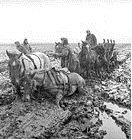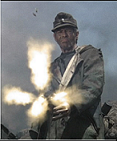Rasputitsa
Posts: 2903
Joined: 6/30/2001
From: Bedfordshire UK
Status: offline

|
I have just finished reading 'The Bloody Triangle - The Defeat of the Soviet Armor in the Ukraine, June 1941' and found it very useful in appreciating the workings of WiTE. The book reads like a very detailed AAR for WiTE, although it covers barely two turns (22nd June - 2nd July 1941) and the focus is on the Lvov, Rovno, Tarnapol axis of the AGS attack, with a particualr emphasis on the Mechanised Corps of the Russian 5th and 6th Armies.
I found it very useful in comparing the operation of WiTE and am now much more comfortable with the game mechanics. The scale of the game matches the way Army Korps/Corps broke down into divisions during combat and the effect of Regimental sized battlegroups on the German side. As you read through the day by day activities of the various units, you cannot avoid the impression that this is just how WiTE works.
After years of WEGO turns in WIR, plotting moves and seeing how they work out, I found that the instant action, searching with the mouse for advantageous routes in WiTE seemed unrealistic. However, in this book, it perfectly represents the movements of the German forces, with motorcycle and armoured car recon. units probing everywhere, looking for river crossings, gaps in the defence and alternative minor roads. Major units were diverted to work round defending forces, easily within the space of a weekly move. PZ divisions following paths used by spearhead units, as in the game with units using MPs to move into enemy areas, with following units conserving MPS to push even further. Again the game mechanics are very close to the description of operations in this book, especially on the German side.
The German sources report the activity of the Russian airforce, which they found quite significant, whilst Russians saw almost no soviet air units, except those burnt out on the ground. How the view point can vary, depending on which side of the bombs you are.
The book also covers the activites and experiences of the troops and middle range commanders, principally from the Russian side. However, there is a lot of detail in OOBs and information on the preparations, or lack of them, in the build up to war.
I am no axis-fanboy looking for a German win at any cost, but the dis-organisation, almost total lack of communication and co-ordination, shortage of equipment and breakdowns suffered by the Russian forces had a significant effect on their performance and hopefully is reflected in the game. However, I am more comfortable with the way the game works having read this book, the feel of the game matches the events described.
These things have been depicted before in many other books, but here you see it unravel day by day (sometimes hour by hour) on one part of the front in a huge conflict. I think it does honour to the Russian soldier, airmen and lower ranking officers to accurately portray in the game the huge disadvantages they had to endure, but still managed to impose delays on the German forces and eventually win a final victory, but could it have gone the other way ?
The war warning reached Russian units as the bombs were dropping during the early hours of 22nd June (events to be repeated at Pearl Harbor later in the year). Some units were already matching towards the battle area as the Soviet leadership reacted to the German concentrations on the border. Stalin expected up to 4 weeks of diplomatic bluster and pressure before hostilities actually started, if Hitler continued to act as he had done previously, they didn't get that breathing space, consequently the Russian forces were caught mostly unprepared.
Kirponos was moving his Front HQ forward on the day of the attack and was out of contact for much of the early action. The small staff left to maintain the old HQ, until the new site took over, could not decode the avalanche of messages that came in that day and re-transmit them, causing an information breakdown. Many Russian motorised divisions did not have their allocation of trucks, the Rifle divisions had horsedrawn transport for their heavy equipment, the 'motorised' infantry were forced to march on foot and carry their mortars, machine guns and stores, even though they covered huge distances it exhausted the troops. Many units had a full complement of enlisted men (many untrained), but only 50% of the officers needed. Some Tank divisions had AFVs allocated from the 'training park', with very little combat value. New vehicles (T34, KV1) had crews with little training, older AFVs suffered from high levels of breakdown and there were no spare parts (one unit having a stop every 15 mins on the march, programmed for running repairs). Some units had no tractors to move artillery, they were to have come from civilian sources as mobilisation took place. Specialist units like recon. and engineers had not been allocated transport, Russian units attacked blind without knowing what was ahead and got stuck at river crossings unable to build, or repair, bridges.
The 8th Mechanised Corps travelled nearly 400 miles, following a series of conflicting orders, before it finally came into contact with the Germans. Whilst South-Western Front was fighting for its life on the 22nd June, at 2300 that evening, Kirponos received Directive No. 3, from Moscow signed by Zhukov, ordering a concentric attack by 5th and 6th Armies to surround the invading German forces, with the Russian pincers ordered to close by the end of 24th June at Lyublin, 80 miles behind German lines in Poland. This is for men carring mortars on their backs and sitting in broken down tanks.
There has been discussion about units escaping pockets and at least on this part of the front there were many examples of units filtering through porus German PZ Division lines, at least until the German infantry divisions came into line to seal the pockets. 1000 men of the Russian 87th Rifle division, encircled on the border, reached Russian lines a week later, after covering 100 miles of disputed territory. There were of course many units who did not escape, however, in that first two weeks, South-Western Front was able to organise a reasonable withdrawl from the outflanked Lvov area. Col. Bagramyan, on the Staff of South-Western front is reported as writing that, Russian forces were only taught to attack and now they were having to learn how to retreat.
Even though I have read dozens of books on this subject, this title left me feeling much more confident in the way that WiTE works, although I am still daunted by the scale of a GC. The game give a very good represenation of action at Army Group and Front scale, as it has been descibed in this book and I found a very useful complement to WiTE. 
< Message edited by Rasputitsa -- 1/22/2011 11:35:37 AM >
|
 Printable Version
Printable Version









 New Messages
New Messages No New Messages
No New Messages Hot Topic w/ New Messages
Hot Topic w/ New Messages Hot Topic w/o New Messages
Hot Topic w/o New Messages Locked w/ New Messages
Locked w/ New Messages Locked w/o New Messages
Locked w/o New Messages Post New Thread
Post New Thread